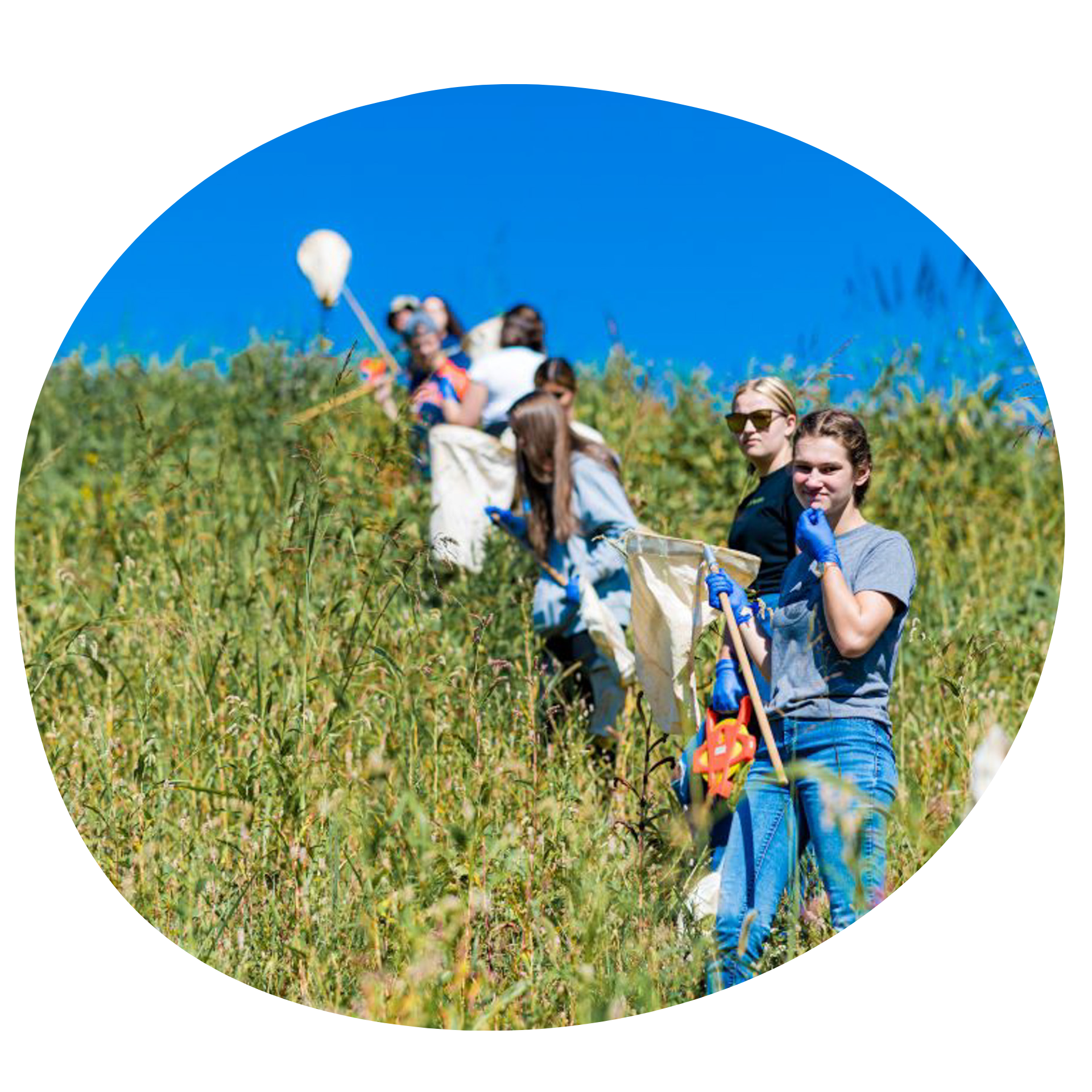conservation outreach
& the new generation
Growing the next
generation of conservationists
There’s nothing we’re prouder of than our role in both mentoring and learning from the next generation of conservationists. Below are some of the programs and partnerships that allow us to do just that.
EcologiGALS
As in most STEM fields, women are vastly underrepresented in conservation and environmental science. Worse, women are clustered in the lower rungs, rarely rising to the top of environmental organizations or research teams. This is a problem not only for gender equity, but for the planet: if we’re going to save our ecosystem, we need everyone on board. EcologiGALs aims to address this disparity by inspiring and preparing middle and high school girls from traditionally underserved communities to explore a career in environmental science, both by engaging them in field work on groundbreaking environmental initiatives and by connecting them to a network of women further along the career path: college conservation science majors, Sustainability Matters’ staff, and women leaders in environmental fields.
EcologiGALs is an 8-week summer program, run in partnership with Fairfax County’s Neighborhood and Community Services (NCS). In 2023, the program’s first year, our staff and EcologiLEADERs (interns from George Mason University’s Smithsonian Mason School of Conservation) engaged participants in hands-on college-level research at our Making Trash Bloom pollinator meadow at the I-66 Transfer Station, and in sessions at NCS community centers they covered a wide range of environmental topics including waste management, plant biodiversity, soil health, watersheds, macroinvertebrate sampling, and native Virginia fauna.
In addition to the educational component of the program, another innovation is the intergenerational female mentorship chain of high schoolers, college students, Sustainability Matters’ own staff, and women environmental entrepreneurs, researchers, and organizers. Through this, both our EcologiGALs and college mentors gain a broader understanding of how environmental science is applicable in a range of careers, and the college mentors begin to view themselves as conservation professionals who have knowledge and skills to offer younger students.
At the conclusion of our first year, 100% of participants reported that they enjoyed the program and felt it improved their understanding of the issues faced by environmental scientists, with one saying the program has made her consider a career in environmental science! Fairfax County Neighborhood and Community Services was so pleased with EcologiGALs that they’ve asked us to serve more of their students and offer year-round workshops through their after-school programming. While we have some expansion planned for 2024 – including monthly after-school workshops in the spring and summer programming at two of their fourteen community centers – we’re actively seeking funding that would allow us to bring EcologiGALs to all fourteen community centers and also launch some similar programming for boys. If you’d like to help make that happen, please consider joining us as an annual member or get in touch to discuss other ways you can get involved!
A massive thank you to the Business Women’s Giving Circle of the Community Foundation of Northern Virginia, Republic Services, and the Chesapeake Bay Trust for making this amazing program possible!

The launch of EcologiGALs in 2023 was enabled by our years-long multi-faceted partnerships with both Mountain Vista Governor’s School (MVGS), a science-focused public high school program serving seven Shenandoah Valley and Piedmont counties, and George Mason University’s Smithsonian-Mason School of Conservation (SMSC), an immersive residential semester program for undergraduates at the Smithsonian Conservation Biology Institute in Front Royal, Virginia.
Alongside the Science Team made up of Sustainability Matters’ adult volunteers, MVGS biology and ecology students monitor our Making Trash Bloom sites, measuring biodiversity, plant growth rates, and erosion. Their work furnishes us with essential data for refining and scaling the Making Trash Bloom model, and the students relish the opportunity to contribute to a groundbreaking project while still in high school. MVGS students also partner with us on a range of other initiatives: developing and delivering educational programming on native plants for elementary-school children; designing outreach materials for Making Trash Bloom; representing Sustainability Matters at community events; and producing a short video series, “Lose Your Lawn,” a trenchant teenage take on America’s biggest (and most toxic) “crop.”
engaging students
from local communities
Smithsonian-Mason students join our team as Sustainability Matters interns and volunteers, helping run everything from webinars for global audiences to our Monarch Migration Game at local festivals. Our interns dive deep into questions like composting regulation and utility-scale solar siting. And a select few serve as EcologiLEADERs during the summer, helping them to grow their own identities as environmental leaders, mentors, and educators.
These partnerships have also laid the groundwork for similar work in other communities. For instance, as we look toward installation of the Sustainability Matters Native Meadow in Winchester’s Jim Barnett Park in the spring of 2024, we’ll be using our existing high school and college partnerships as models to engage Winchester students in educational and research opportunities at the new meadow. If you’re a student, parent, educator, or community leader in Winchester and you’d like students from your school or community organization to be involved, please contact us using this form.






